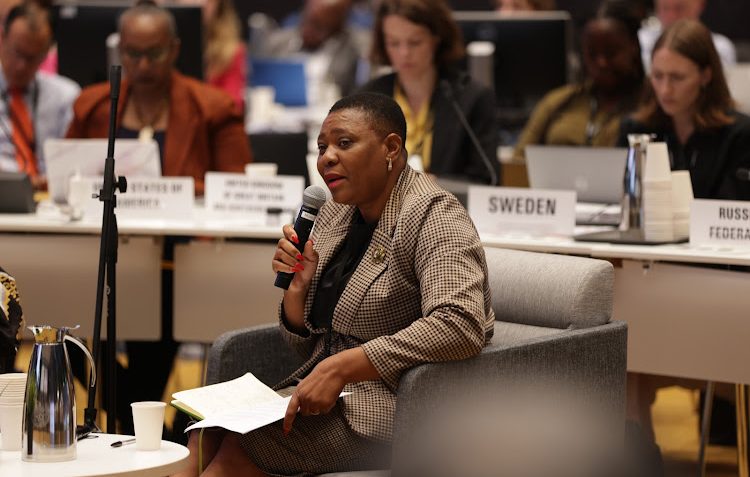Highlights from the UNAIDS Programme Coordinating Board meeting

Last week Frontline AIDS joined the 54th meeting of the UNAIDS Programme Coordinating Board to voice our concerns about the impact of anti-rights opposition on achieving HIV targets. We emphasised the need for greater investment in community-led responses and highlighted specific challenges facing the HIV response in the Middle East and North Africa.
The PCB opened with the report of UNAIDS’ Executive Director, Winnie Byanyima, announcing a new High-Level Panel, which will consider how the UNAIDS operating model must adapt for the future. The Panel responds to the funding shortfall facing UNAIDS ($20 million is currently missing from its 2024 budget) and recent messages from both Board members and last year’s Multilateral Organisation Performance Assessment Network (MOPAN) report, that UNAIDS needs to focus on areas where it brings added value. On day one, Precious Matsoso, Co-Chair of the Intergovernmental Negotiating Body on the Pandemic Accord, also delivered a powerful address. She urged PCB members to tackle inequality with the same vigour used to develop vaccines and medicines, asking them to “make the right choices – an important act that can save lives”. Responding on behalf of the NGO Delegation, our Head of Global Advocacy, Fionnuala Murphy, requested that the PCB work together to secure stronger commitments on ending AIDS in the Pandemic Accord, with leadership from UNAIDS.
On day two, the funding shortfall was highlighted again as the UNAIDS Staff Association reported on the heavy workloads faced by its employees. The day also reviewed results delivered against the Unified Budget, Results and Accountability Framework (UBRAF), showing strong impact in several areas but slower progress in reaching key populations and uneven results and data quality across regions. At a side event, UNAIDS’ unveiled its new Results and Transparency Portal, which promises to be a valuable resource for Frontline AIDS advocacy and decision-making going forward.
In response to the UBRAF reports, Frontline AIDS’ Human Rights Lead, Oratile Moseki, warned that anti-rights actors are undermining impact for key populations, and challenged PCB members to avoid complicity with them. She called for a well-resourced UNAIDS able to support communities and governments to resist anti-rights mobilisation. Later, the PCB discussed follow up to last December’s thematic meeting on HIV testing. A moving intervention by NGO Delegate Myles Mwanza (Executive Director for the Zambian Network of Young People Living with HIV, a partner on our READY programme) persuaded delegates to agree a strong set of decision points to close HIV testing gaps.
Day three centred around a thematic session on sustainability, which included Cindy Kelemi from Frontline AIDS partner BONELA (the Botswana Network on Ethics, Law and HIV/AIDS) as one of five civil society speakers. Cindy gave a compelling address urging governments, donors and other stakeholders engaged in sustainability and transition planning to first assess the current situation. She argued that “if we integrate the HIV response into an already ailing system, we run the risk of eroding the gains we’ve achieved and harming people living with HIV.” She also highlighted that while Botswana had reached the 95-95-95 targets, it had not yet achieved this level for vulnerable populations. Emphasising community systems as an integral component of health systems, with an important role in reaching key populations, Cindy called on UNAIDS to provide model strategies for strengthening and engaging community systems.
Golda Eid, who leads Frontline AIDS’ Programme Management Unit in Beirut, intervened during the thematic session, asking PCB members to recognise the challenges facing the HIV response in the Middle East and North Africa, and to support concerted efforts on financial sustainability, community leadership and policy reform in MENA. Alongside Elie Aaraj of the MENA Coalition on HIV and Human Rights, Golda also met with senior staff at UNAIDS, mapping out actions to strengthen UNAIDS’ collaboration with communities and civil society in MENA.
As the thematic meeting closed, Fionnuala Murphy made a second intervention, arguing that the national sustainability roadmaps that are currently under development in many countries must include commitments to deliver on the 10-10-10 targets (on punitive laws and policies, stigma and discrimination, and gender inequality and violence), to increase sustainable funding for community responses, and to address the risks of integration for people living with HIV and communities. Ahead of the PCB, Frontline AIDS partners the African Sex Workers Alliance (ASWA), BONELA, Education as a Vaccine, India HIV/AIDS Alliance, Kimirina, MENAHRA and SAfAIDS took part in a Civil Society Advisory Group, which helped to formulate these recommendations and shape the background note for the thematic.
The 54th PCB closed with a decision to hold the next meeting, which will include a much-needed thematic session on children and HIV in Nairobi, hosted by the current PCB Chair, Kenya. While delegates welcomed the opportunity to bring the PCB closer to where most people with HIV live, they raised concerns about Kenya’s position on the rights of key populations, particularly in the context of anti-LGBTQ+ activity. It is critical for the Kenyan government and UNAIDS to work closely with key population communities and civil society to ensure the next PCB strengthens Kenya’s resistance to anti-rights mobilisation, and bolsters its national HIV response. Frontline AIDS looks forward to supporting our partners in Kenya and around the world to have a strong voice in the 55th PCB, and beyond.
Tags
Adolescents and young peopleHIV preventionHuman rightsUNAIDS

